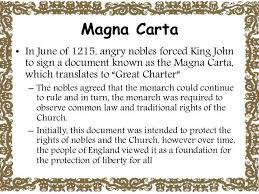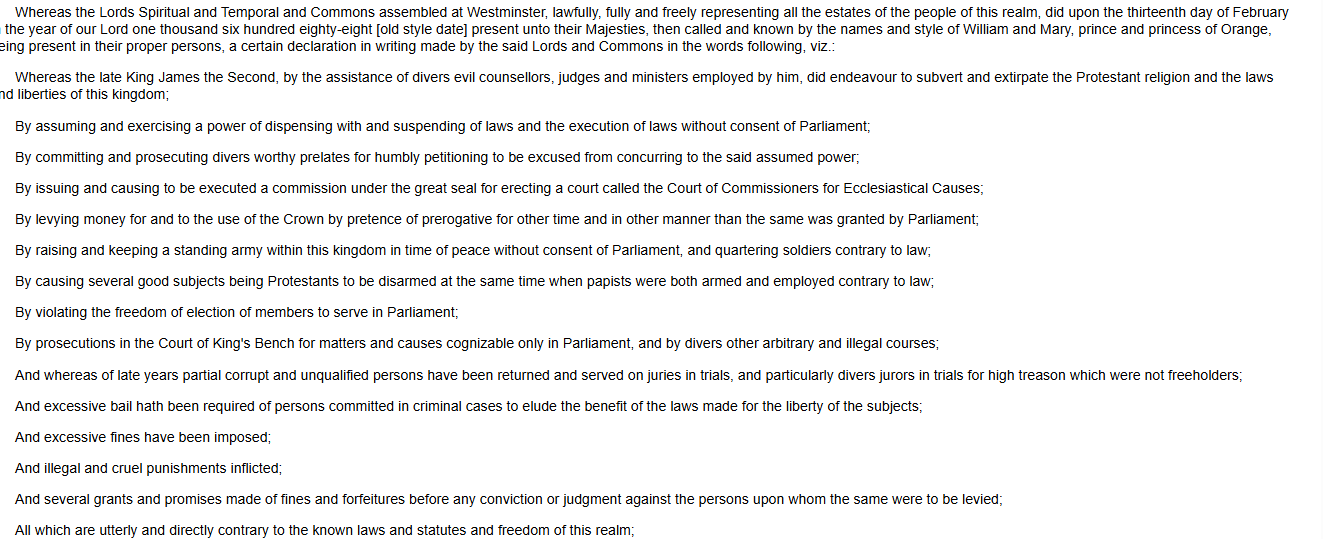Module 1 FCLE
1/18
There's no tags or description
Looks like no tags are added yet.
Name | Mastery | Learn | Test | Matching | Spaced |
|---|
No study sessions yet.
19 Terms
Magna carta (1215)
addressed discontent with the king and sought to prevent king from exploiting his power
stated king was not above the law-he and his govt officials have to follow the law like everyone else
established that individuals had certain rights that could not be infringed upon

English Declaration of Rights (1689)
Listed all the wrongs the king has done
Came abt bc of tension over who should rule; an individual or the people
limited the power of the monarchy, elevated the status of Parliament and outlined specific rights of individuals.

English bill of rights key liberties
https://www.history.com/articles/english-bill-of-rights#What's-in-the-Bill-of-Rights
Freedom to elect members of Parliament, without the king or queen’s interference
Freedom of speech in Parliament
Freedom from royal interference with the law
Freedom to petition the king
Freedom to bear arms for self-defense
Freedom from cruel and unusual punishment and excessive bail
Freedom from taxation by royal prerogative, without the agreement of Parliament
Freedom of fines and forfeitures without a trial
Freedom from armies being raised during peacetimes
John Locke
Philosopher and political theorists'
influenced the bill of rights
He stated that government should have a duty to it’s citizens, not the other way around.
first person to suggest that if a people disapprove of their government, they should possess the power to change it as they see fit.
John Locke’s social contract theory
States that life, liberty, and property are given to us by nature and shouldn't be taken away.
Locke’s theory states that people form governments in order to protect these rights, but in order for that to work, people have to follow the laws the government makes.
Thomas Hobbes’ social contract theory
Philosopher and political theorist
believed the state of nature was a "war of all against all," characterized by chaos, fear, and a constant threat to life and property. Theory argued humans were naturally selfish and driven by a desire for power
individuals entered a social contract, surrendering their rights and liberties to a powerful sovereign (a monarch or absolute government) in exchange for security and order.
Locke and Hobbes
Their writings made it possible for there to be life liberty and property. This consisted of rights which cannot be taken away from the people.
Stamp act (1765)
The stamp act declaration of rights (1765)
The Stamp Act Congress passed a "Declaration of Rights and Grievances," which claimed that American colonists were equal to all other British citizens, protested taxation without representation, and stated that, without colonial representation in Parliament, Parliament could not tax colonists.
asserted that colonists were entitled to taxation only with their consent, or by their own elected representatives

The intolerable acts (1774)
1st Continental Congress Declaration and Resolves (1774)
The First Continental Congress issued this statement that codified colonial objections to the Intolerable Acts and listed other grievances against the Crown. It concluded with Congress's plan to boycott British trade, publish addresses to both the colonies and mother country, and send a petition to the king.
2nd Continental Congress (Declaration of independence) (1776)
At the Second Continental Congress meeting, the colonists drafted the Olive Branch Petition in hopes of gaining King George III's support against the Parliament. Ultimately, the Second Continental Congress voted to declare independence from Great Britain.
Montesquieu's influence on the constitution
French political philosopher
discussion of separation of powers and checks and balances profoundly influenced the American founders and the design of the U.S. Constitution.
Separation of powers
The mayflower (1620)
The Mayflower was a cargo ship that carried Protestant Separatists, known as Pilgrims, from England to North America. Pilgrims sought religious freedom and to establish a new church in the New World IN PLYMOUTH.
Mayflower compact
Document signed in 1620 by the adult male passengers of the ship Mayflower, establishing a temporary government for the Plymouth Colony
Federalists
Anti-federalists
The federalist papers
Thomas Paine